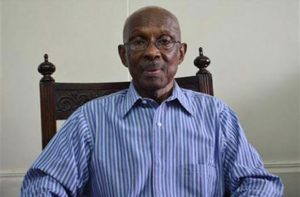–due to current impediments frustrating work of the councils
WHILE the local government system in Guyana has been developed since its revitalisation in 2016, many Mayors are of the opinion that the Municipal and District Councils Act Chapter 28:01 presents several limitations and impediments in the performance of their duties, and as such, are calling for a reform of the Act.
The lack of executive power in the council, the one-year term limit for Mayors and Deputy Mayors, penalties and building codes are just a few of the areas in need of changes, according to the mayors.
“The entire Chapter 28:01, we need to have a reform of. I will push for that in 2020,” said Mayor of Georgetown Ubraj Narine, while speaking to reporters last Wednesday, moments after being re-elected to his second term as Mayor of the City of Georgetown.

Serving since January 2019, Narine’s frustration with how Chapter 28:01 has hampered the functionality of the City Council is well recorded, particularly in dealing with administrative matters. Narine’s sentiments have been echoed by several mayors. And while some differ on where and how the changes should be made, they unanimously agree that change is needed.
Enacted since 1969, and last amended in 2013, Chapter 28:01 of the Act at reference governs the operations and powers of municipalities. However, many of the mayors consider the Act to be outdated, and in some areas restrictive to the smooth functioning of municipalities. Guyana has 10 municipalities.
“I do believe that all mayors believe that Chapter 28:01 needs to be revised. In some areas, it’s not so much the concept, but I think it’s the relevance of the concepts to this time,” noted Waneka Arrindell, Mayor of Linden.
Arrindell, who is also President of the Guyana Association of Municipalities (GAM), the collective body for Mayors and other councilors, emphasised the need for change in areas of the Act dealing with penalties and taxes.
“The fines that are set for the different penalties are still set for the 1976 timeline and economy. As such, those need to be revised to bring municipalities up to the standard of what we are facing right now, especially financially,” she said.
Mayor of Anna Regina Rajendra Prabulall also underscored the need to update rates and taxes.
“Currently, the 28:01 that is there that deals with all these operations, it needs to be examined and changes need to come,” he said, adding: “It needs a lot of changes on the operations of the municipality in terms of rates of tax collection and so on. That is what the council depends on; the heart of the council is money.”
New Amsterdam Mayor Winifred Heywood said it affects her municipality’s ability to deal with the situation of litter.
“If we want to address littering on the road with the garbage situation, we have to change that. And there are other things as it relates to penalties to people, in different aspects,” she said.
BONE OF CONTENTION
Another major bone of contention for the mayors is the power dynamics between the administration and the council, which they believe frustrates the functioning of the municipalities.
In their current state, municipalities function with two components: The Councils, which are headed by the elected Mayors, and the administration, headed by the Town Clerks.
Councillors are elected to the municipalities at Local Government Elections, which are held no more than three years apart. Mayors and Deputy Mayors are elected by the Councillors from among the sitting councillors.
However, there is no executive authority placed on the municipal council, with the Town Clerk considered to be the Chief Executive Officer or Chief Administrator, having the general responsibility of coordinating the work of the Council.
While Chapter 28:01 specifies that the Town Clerk is subject to the general and specific directions of the Council, there are many instances where mayors butt heads with their Town Clerks, and of Town Clerks acting on their own accord, or even going against a decision taken by the Council.

Similar situations have also occurred between the Council and other department heads and other officers of the administration.
“Chapter 28:01 gives certain powers to the departmental heads, the town clerk in particular, the engineer, the chief constable, and so forth, where, in spite of several reports, those fellows sort of behave as though they are law unto themselves,” attested former Georgetown Mayor Hamilton Green, whose clashes with former Town Clerk Carol Sooba are legendary, as they have been well recorded.
“We took decisions as a council to do certain things, and she, with the [then] Minister’s support defied us. And there were hundreds of examples,” Green recalled.
Green, who served from 1993 –1995, and then 1996 – 2015, is Guyana’s longest serving Mayor, and is all too familiar with the difficulties that Chapter 28:01 presents to Mayors in the functioning of their duties. He empathised with the struggle Narine and some of the other Mayors face.
He, too, noted that the one-year term for Mayors and Deputy Mayors is too short. Though LGE is set for every three years, Chapter 28:01 currently calls for elections of Mayors and Deputy Mayors to be held annually.
“The Mayors do believe that one year is too short a time for a mayor to make significant changes, and so they believe that at this time, the entire three years should be set aside,” Arrindell says.
Mayor of Mahdia David Adams agrees.
“I strongly support it. So instead of [Mayors] serving for one year and having to be re-elected every year, they should be given some more time, so you can get your plans and programmes going for three years. Those are some of the things that we have to look at to improve the lives and work of the Mayors and deputy Mayors,” Adams said.
Green said that as much as reform is needed, the process should be thorough, and see consultations with several stakeholders before going forward.
“It’s a monumental challenge,” he said, adding:
“It’s a policy decision for the government and the citizens to decide; it’s not a matter that can be done simply. Even before it goes to Parliament, it ought to be discussed with civil society and the ministry itself to decide what are the existing dynamics. Things change over time, and we only just restored the integrity of the local government system. And one has to take account of that, and ensure firstly that the people are in tune with the responsibilities of the Mayor.”



.jpg)











